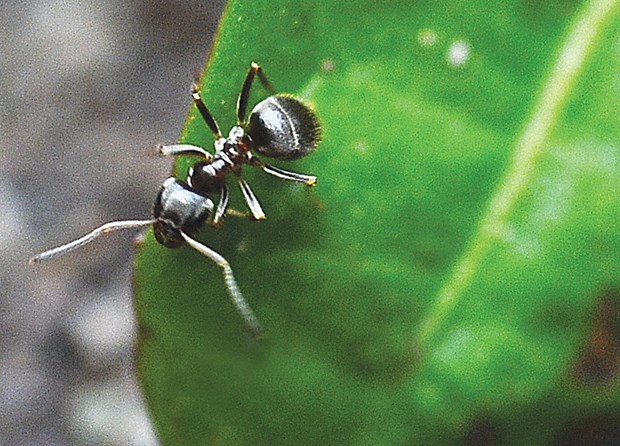As the summer heats up so do the flourishing colonies of ants that are found in our gardens.
Unlike many other insect pests, ants are very difficult to control in an environmentally friendly way. Even though ants do improve soil aeration and drainage, their benefits are far outweighed by their nuisance and plant-related damage. Ants can also be structural pests, but I am not going to discuss those specific ant species in this column.
Several facts must be considered when trying to control ants in the garden. Firstly, due to the prolific use of pesticides over the last 50 years, most ant species have genetically adapted and mutated to breed resistance to pesticides. The more pesticide you spray to kill ants, the more they become resistant. I don't believe that most sales people are even aware of that fact. Secondly, ants generally prefer to live in dry, free-draining soil. Thirdly, other than ant eaters, there are few, if any, natural pests for ants. Lastly, mulch absolutely does not attract ants.
Ants cause plant-related problems by farming aphids or scale on the foliage or the plant's root system. Many ant species will even take aphids down into the ground before winter starts so they can farm the aphids on the roots during winter. In spring the aphids are brought back up onto the foliage to feed and be farmed. You will often see black aphids being tended by ants. Ants squeeze the rear end of aphids and drink the sugar-rich excrement as well as cannibalizing the aphids needed to feed the colony.
To successfully control ants several controls should be used simultaneously to achieve the best effect. Water is one of the simplest and safest tools to use for control. Wherever you find colony entrances, place a garden hose and let it slowly trickle down the entrance to flood the colony. Always disturb colony entrances to force the ants into repair mode instead of foraging mode.
Chemical fertilizer should be avoided because it forces soft plant tissue growth that is easier for pests to eat.
And chemically fertilized plants undergo stress, which attracts ants and other pests to the plant. As for pesticides to control ants, if you want to poison the environment, pets and children while breeding resistance, go ahead, but you might as well throw your money in the garbage.
On trees, ants can often be seen crawling up and down the trunk as they tend their aphid or scale farms. Use sticky Tanglefoot or Vaseline applied to a protective band on the trunk to prevent the ants from climbing the trunk. Protective bands include plastic kitchen wrap and tape like duct tape, which protects the trunk from damage from the Tanglefoot. Before the band is in place thoroughly wash the tree's branch tips to knock off all the aphids.
There are several home remedies that can control ants. Citronella or peppermint, tea tree and cinnamon oils will work as preventative measures to keep ants away but not to kill many of them. Natural citrus products have also shown some effectiveness in keeping ants away. Liquid Borax (sold premixed) is an effective and relatively benign product that will kill ants. Borax must be applied along ant runs in small doses. If it rains, the Borax must be reapplied. Borax will be eaten by the ants and taken back to the colony and fed to the queen and larvae, which kills them.
Borax works by preventing stomach digestion, which starves the ants to death. Although Borax can be toxic if ingested by humans, it breaks down in the environment and has no long-term toxicity.
Digging up the entire colony can be effective if the colony can be accessed without too much damage to the garden's plants or structures. When digging, put all of the infected soil, ants and larvae into a plastic bag and put it in the garbage. Dig deep and wide and disturb the hell out of the colony. Then, as the ants begin to attack, use a shop vacuum and suck up the little buggers. Empty the shop vac into a plastic bag. Be sure to look for ant larvae, which look like small pieces of puffed wheat cereal. Once you've finished vacuuming, thoroughly water the area to drown any missed ants and to flood any missed portions of the colony. Allow the dig site to dry before replanting or repairing.
If ants are farming aphids on your plants, use an adjustable nozzle on the garden hose. Control the water pressure and adjust the nozzle to provide a strong, focused and concentrated water stream that you spray at the ants and aphids. The stream of water washes the ants and aphids off and waters the plant simultaneously.
Todd Major is a journeyman horticulturist, garden designer and builder, teacher and organic advocate. [email protected]



